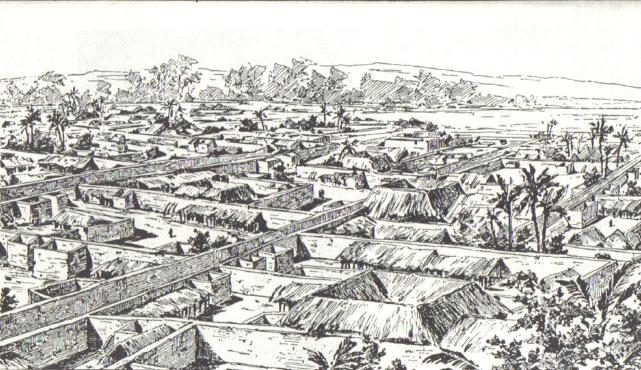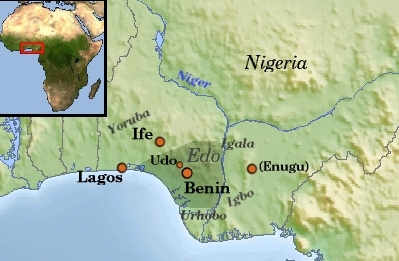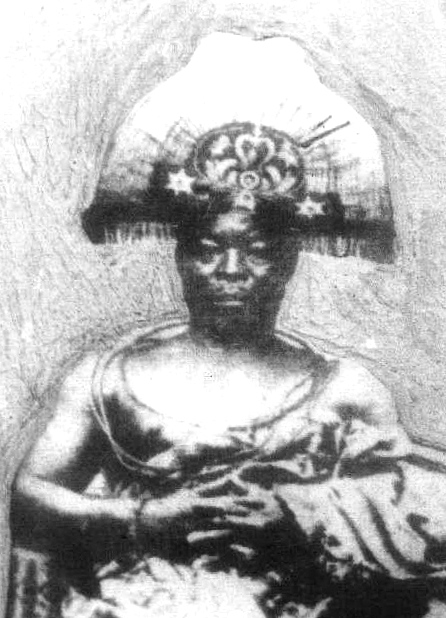|
Ewuare
Ewuare (also Ewuare the Great or Ewuare I) was the Oba (king) of the Benin Empire from 1440 until 1473. Ewuare became king in a violent coup against his brother Uwaifiokun which destroyed much of Benin City. After the war, Ewuare rebuilt much of the city of Benin, reformed political structures in the kingdom, greatly expanded the territory of the kingdom, and fostered the arts and festivals. He left a significant legacy and is often considered the first King of the Kingdom of Benin. Rise to power Prior to Ewuare, the Oba of Benin was limited in their power and authority by the ''uzama'', a group of hereditary chieftains throughout the kingdom. The ''uzama'' were able to appoint the Oba of Benin upon the death of an Oba and could limit any efforts by the Oba. The rise of Ewuare to a position of power is chronicled by Benin's oral history. Ewuare was born as the third son of the Oba Ohen. At this point, Ewuare was known by the name Prince Ogun. Ohen was deposed and stoned t ... [...More Info...] [...Related Items...] OR: [Wikipedia] [Google] [Baidu] |
Benin Empire
The Kingdom of Benin, also known as the Edo Kingdom, or the Benin Empire ( Bini: '''') was a kingdom within what is now southern Nigeria. It has no historical relation to the modern republic of Benin, which was known as Dahomey from the 17th century until 1975. The Kingdom of Benin's capital was Edo, now known as Benin City in Edo State, Nigeria. The Benin Kingdom was "one of the oldest and most developed states in the coastal hinterland of West Africa". It grew out of the previous Edo Kingdom of Igodomigodo around the 11th century AD, and lasted until it was annexed by the British Empire in 1897. Oral traditions The original people and founders of the Benin Kingdom, the Edo people, were initially ruled by the Ogiso (Kings of the Sky) who called their land Igodomigodo. The first Ogiso (Ogiso Igodo), wielded much influence and gained popularity as a good ruler. He died after a long reign and was succeeded by Ere, his eldest son. In the 12th century, a great palace intrigue ... [...More Info...] [...Related Items...] OR: [Wikipedia] [Google] [Baidu] |
Benin Empire
The Kingdom of Benin, also known as the Edo Kingdom, or the Benin Empire ( Bini: '''') was a kingdom within what is now southern Nigeria. It has no historical relation to the modern republic of Benin, which was known as Dahomey from the 17th century until 1975. The Kingdom of Benin's capital was Edo, now known as Benin City in Edo State, Nigeria. The Benin Kingdom was "one of the oldest and most developed states in the coastal hinterland of West Africa". It grew out of the previous Edo Kingdom of Igodomigodo around the 11th century AD, and lasted until it was annexed by the British Empire in 1897. Oral traditions The original people and founders of the Benin Kingdom, the Edo people, were initially ruled by the Ogiso (Kings of the Sky) who called their land Igodomigodo. The first Ogiso (Ogiso Igodo), wielded much influence and gained popularity as a good ruler. He died after a long reign and was succeeded by Ere, his eldest son. In the 12th century, a great palace intrigue ... [...More Info...] [...Related Items...] OR: [Wikipedia] [Google] [Baidu] |
Kingdom Of Benin
The Kingdom of Benin, also known as the Edo Kingdom, or the Benin Empire ( Bini: '''') was a kingdom within what is now southern Nigeria. It has no historical relation to the modern republic of Benin, which was known as Dahomey from the 17th century until 1975. The Kingdom of Benin's capital was Edo, now known as Benin City in Edo State, Nigeria. The Benin Kingdom was "one of the oldest and most developed states in the coastal hinterland of West Africa". It grew out of the previous Edo Kingdom of Igodomigodo around the 11th century AD, and lasted until it was annexed by the British Empire in 1897. Oral traditions The original people and founders of the Benin Kingdom, the Edo people, were initially ruled by the Ogiso (Kings of the Sky) who called their land Igodomigodo. The first Ogiso (Ogiso Igodo), wielded much influence and gained popularity as a good ruler. He died after a long reign and was succeeded by Ere, his eldest son. In the 12th century, a great palace intrigue er ... [...More Info...] [...Related Items...] OR: [Wikipedia] [Google] [Baidu] |
Edo People
The Edo or Benin people are an Edoid ethnic group primarily found in Edo State, Southern part of Nigeria. They speak the Edo language and are the descendants of the founders of the Benin Empire. They are closely related to other ethnic groups that speak Edoid languages, such as the Esan, the Afemai, the Isoko, and the Urhobo. The name "Benin" (and "Bini") is a Portuguese corruption, ultimately from the word "Ubini", which came into use during the reign of Oba (ruler) Ewuare the Great, c. 1440. "Ubini", a word meaning Vexation, used by Prince Oranmiyan, son of the wealthy ruler of Uhe (Ife) to describe the frustration he encountered after he was invited to rule benin. ''Ubini'' was later corrupted to ''Bini'' by the mixed ethnicities living together at the centre; and further corrupted to ''Benin'' around 1485 when the Portuguese began trade relations with Oba Ewuare giving them coral beads. History Administrative region Edo people can be found in Nigeria's ... [...More Info...] [...Related Items...] OR: [Wikipedia] [Google] [Baidu] |
Ozolua
Ozolua, originally called Okpame and later called Ozolua n'Ibaromi (Ozolua the Conqueror), was an Oba of the Kingdom of Benin from 1483 until 1514. He greatly expanded the Kingdom through warfare and increased contact with the Portuguese Empire. He was an important Oba in both history of the Kingdom of Benin and retains importance in the folklore and celebrations of the region. History Prince Okpame was the third and the youngest son of Ewuare who had significantly expanded the Kingdom of Benin during his reign from 1440 until 1473. Following the death of Ewuare, his eldest surviving son, Esi, was assassinated by a poison arrow at his coronation and his second oldest son, Olua, ruled with significant domestic dissent for seven years. After a short-lived rule of the kingdom by a collection of chieftains, Prince Okpame was named the ''Oba'' (in either 1480 or 1483) and took the name ''Ozolua''. His rule was defined largely by significant military expansion of the Kingdom of ... [...More Info...] [...Related Items...] OR: [Wikipedia] [Google] [Baidu] |
Benin Art
Benin art is the art from the Kingdom of Benin or Edo Empire (1440–1897), a pre-colonial African state located in what is now known as the Southern region of Nigeria. Primarily made of cast bronze and carved ivory, Benin art was produced mainly for the court of the Oba of Benin – a divine ruler for whom the craftsmen produced a range of ceremonially significant objects. The full complexity of these works can be appreciated through the awareness and consideration of two complementary cultural perceptions of the art of Benin: the Western appreciation of them primarily as works of art, and their understanding in Benin as historical documents and as mnemonic devices to reconstruct history, or as ritual objects. This original significance is of great importance in Benin. Importance of Art in Benin Culture The Kingdom of Benin was powerful, but Benin culture has not been given proper recognition by western scholars. The story of how the Kingdom of Benin began as a culture and n ... [...More Info...] [...Related Items...] OR: [Wikipedia] [Google] [Baidu] |
Igue Festival
Igue festival (also known as King’s Festival) is a celebration with its origin in the Benin Kingdom of Edo State, Nigeria Nigeria ( ), , ig, Naìjíríyà, yo, Nàìjíríà, pcm, Naijá , ff, Naajeeriya, kcg, Naijeriya officially the Federal Republic of Nigeria, is a country in West Africa. It is situated between the Sahel to the north and the Gulf o .... One tradition states that the festival date coincided with the marriage of Ewuare to a wife named Ewere. Celebrated between Christmas and New Year, the festival includes the Oba's blessing of the land and his people. During the Igue ritual season, the Oba is prohibited from being in the presence of any non-native person. History The Igue Festival was initiated in the 14th century during the reign of Oba Ewuare I, who reigned in Benin between year 1440 and 1473. Following Oba Ewuare I's experience whilst fighting as a prince for the Benin throne, he was known as the Prince Ogun, the son of Oba Ohen as at the ... [...More Info...] [...Related Items...] OR: [Wikipedia] [Google] [Baidu] |
Oba Of Benin
The Oba of Benin is the traditional ruler and the custodian of the culture of the Edo people and all Edoid people. The then Kingdom of Benin (not to be confused with the modern-day and unrelated Republic of Benin, which was then known as Dahomey) has been and continues to be mostly populated by the Edo (also known as Benin ethnic group). In 1897, a British military force, of approximately 1,200 men, under the command of Sir Harry Rawson, mounted the Benin punitive Expedition. The force dispatched in retaliation to the ambush of a British party, at Ugbine village near Gwato, on the 4th January 1897, by a group of Benin soldiers, acting without orders from the Oba; the ambush had led to the deaths of all but two of the British party. The British force captured the capital of the Kingdom of Benin, sacking and burning the city while forcing the Oba of Benin, Ovonramwen, into a six-month exile. The expeditionary force consisted of both indigenous soldiers and British officers bas ... [...More Info...] [...Related Items...] OR: [Wikipedia] [Google] [Baidu] |
Benin City
Benin City is the capital and largest city of Edo State, Nigeria. It is the fourth-largest city in Nigeria according to the 2006 census, after Lagos, Kano, and Ibadan, with a population estimate of about 3,500,000 as of 2022. It is situated approximately north of the Benin River and by road east of Lagos. Benin City is the centre of Nigeria's rubber industry, and oil production is also a significant industry. The city was the most important settlement of the Edo Kingdom of Benin, which flourished during the 13th to the 19th century. It held important trade relations with Portugal during the last centuries before being captured, sacked and burnt in 1897 by a British punitive expedition. Many bronze sculptures in Benin City palace, collectively termed the Benin Bronzes, were taken by the British who followed up their victory by gradually colonizing the area, eventually incorporating the region into Colonial Nigeria. The indigenous people of Benin City are the Edo people ... [...More Info...] [...Related Items...] OR: [Wikipedia] [Google] [Baidu] |
15th-century Nigerian People
The 15th century was the century which spans the Julian dates from 1 January 1401 ( MCDI) to 31 December 1500 ( MD). In Europe, the 15th century includes parts of the Late Middle Ages, the Early Renaissance, and the early modern period. Many technological, social and cultural developments of the 15th century can in retrospect be seen as heralding the "European miracle" of the following centuries. The architectural perspective, and the modern fields which are known today as banking and accounting were founded in Italy. The Hundred Years' War ended with a decisive French victory over the English in the Battle of Castillon. Financial troubles in England following the conflict resulted in the Wars of the Roses, a series of dynastic wars for the throne of England. The conflicts ended with the defeat of Richard III by Henry VII at the Battle of Bosworth Field, establishing the Tudor dynasty in the later part of the century. Constantinople, known as the capital of the wo ... [...More Info...] [...Related Items...] OR: [Wikipedia] [Google] [Baidu] |
Oba (king)
Oba means ″ruler″ in the Yoruba and Bini languages of West Africa. Kings in Yorubaland, a region which is in the modern republics of Benin, Nigeria and Togo, make use of it as a pre-nominal honorific. Examples of Yoruba bearers include Oba Ogunwusi of Ile-Ife, Oba Aladelusi of Akure, and Oba Akiolu of Lagos. An example of a Bini bearer is Oba Ewuare II of Benin. The title is distinct from that of Oloye, which is itself used in like fashion by subordinate titleholders in the contemporary Yoruba chieftaincy system. Aristocratic titles among the Yoruba The Yoruba chieftaincy system can be divided into four separate ranks: royal chiefs, noble chiefs, religious chiefs and common chiefs. The royals are led by the obas, who sit at the apex of the hierarchy and serve as the fons honorum of the entire system. They are joined in the class of royal chiefs by the titled dynasts of their royal families. The three other ranks, who traditionally provide the membership of a series o ... [...More Info...] [...Related Items...] OR: [Wikipedia] [Google] [Baidu] |
Ancient Benin City
Ancient history is a time period from the beginning of writing and recorded human history to as far as late antiquity. The span of recorded history is roughly 5,000 years, beginning with the Sumerian cuneiform script. Ancient history covers all continents inhabited by humans in the period 3000 BCAD 500. The three-age system periodizes ancient history into the Stone Age, the Bronze Age, and the Iron Age, with recorded history generally considered to begin with the Bronze Age. The start and end of the three ages varies between world regions. In many regions the Bronze Age is generally considered to begin a few centuries prior to 3000 BC, while the end of the Iron Age varies from the early first millennium BC in some regions to the late first millennium AD in others. During the time period of ancient history, the world population was already exponentially increasing due to the Neolithic Revolution, which was in full progress. While in 10,000 BC, the world population stood at ... [...More Info...] [...Related Items...] OR: [Wikipedia] [Google] [Baidu] |







